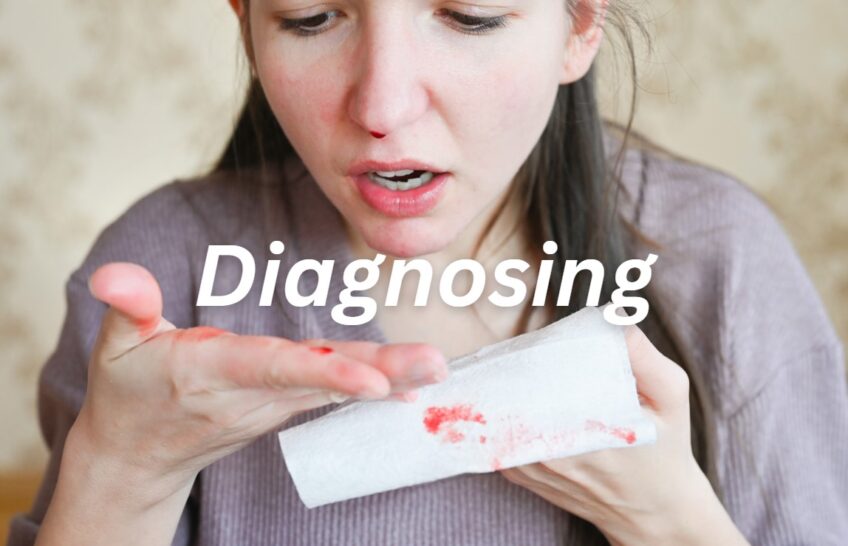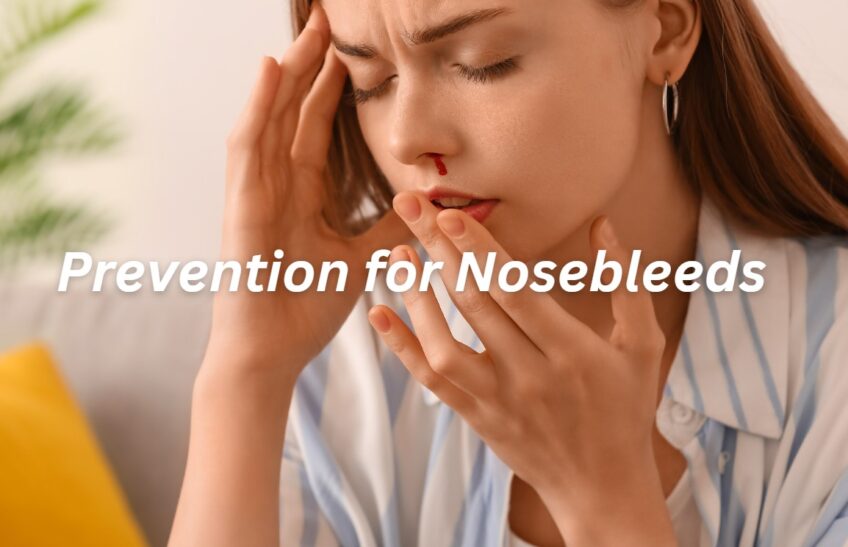According to research, 60% of people have had a nosebleed at least once. Yes! Nasal bleeding is quite typical and generally not a serious cause for worry. However, you should take special precautions while treating nosebleeds that have blood clots.
Page Contents
- 1 Why do nose blood clots occur?
- 2 What exactly is a nosebleed that has blood clots?
- 3 What Causes Nosebleeds?
- 4 Can Nosebleeds with Blood Clots Indicate Other Serious Illnesses?
- 5 Diagnosing a Nosebleeds with Blood Clots
- 6 What Causes Nosebleeds When You Are Sleeping?
- 7 Best Way to Stop a Nosebleeds with Blood Clots
- 8 Use a cold compress.
- 9 Prevention for Nosebleeds with Blood Clots
- 10 What to Eat After a Nosebleed?
- 11 FAQ
- 11.1 Q: What are some other ways to prevent nosebleeds with blood clots?
- 11.2 Q: How long should I wait before seeking medical attention for a nosebleed with blood clots?
- 11.3 Q: Can certain medications increase the risk of nosebleeds with blood clots?
- 11.4 Q: Are there any home remedies that can help stop a nosebleed with blood clots?
- 11.5 Q: Can nosebleeds with blood clots be a sign of a more serious health condition?
- 12 Summary
Why do nose blood clots occur?
The role of blood in our bodies is intricate. For the duration of your life, it must flow steadily and constantly throughout your body. However, it must be turned off right away to prevent spills if you cut yourself or suffer an accident.
Blood clots are produced in order to halt bleeding, or to put it another way, bleeding ceases when a blood clot forms.
Blood clots may range in size. A typical blood clot is around the size of a dime. Very huge clots are those that are the size of a quarter or larger. If you get significant blood clots in your nose after bleeding, seek medical attention right once.
What exactly is a nosebleed that has blood clots?
When blood vessels in the nose burst, bleeding results. A blood clot forms in the nose as the body’s reaction to this injury. This seals off the blood vessels that are injured and keeps the blood from leaking. Blood clots in the nose are quite common but rarely dangerous.
What Causes Nosebleeds?
Most often, dilated blood vessels on the front bottom of the nose cause nosebleeds.
It’s unclear what caused the dilation. However, allergies or infections are typically at fault.
Less frequently, dryness and nose-picking cause nosebleeds. Our noses are sensitive to discomfort because they have several tiny blood veins on their surface. Nose picking is more common when the mucus in the nose is dry and crusty.
Other rare causes of nosenosebleeds with blood clots include:
- reactions to medication which inhibits natural clotting,
- damage from non-medicinal use of cocaine,
- drying out of the mucosa due to prior injury, and even tumors.
Can Nosebleeds with Blood Clots Indicate Other Serious Illnesses?

Yes, Nosebleeds can result from a range of other health issues. These include:
- Hypertension.
- Heart ailments (mainly in the elderly).
- Thrombocytopenia (deficient level of platelets in the blood).
- Leukemia.
- Hemophilia.
- Fractures.
- HIV.
- Von Willebrand Disease (hereditary blood clotting disorder).
- Severe liver ailments.
Most nosebleeds heal by themselves. A doctor is not required unless the bleeding persists for more than 20 minutes or happens following an injury.
A fall, a car accident, or a blow to the face are among the accidents that could cause a nosebleed. Post-injury nosebleeds could indicate a broken nose, skull fracture, or internal bleeding.
Diagnosing a Nosebleeds with Blood Clots

If the nosebleed is a single, spontaneously ending episode, there is no need for a medical exam. If it is persistent or difficult to control, you should visit an ENT specialist.
Consult an ENT doctor if you think a nosebleed is challenging to stop, happens frequently, or if there are no obvious sources of irritation or trauma.
The precise cause of a nosebleed cannot be determined by a single test. Consequently, a number of diagnostic techniques may be required to identify the cause. Inform your doctor of any additional symptoms you feel as well as any recent wounds. The following are the most often performed tests to identify nosebleeds:
- Nasal endoscopy, which is a procedure to examine the inside of the nose,
- Complete blood count (CBC), which is a blood test to look for blood problems,
- Partial thromboplastin time (PTT) measures how long your blood clot takes.
- Face and nose X-rays and
- A CT scan of the nose
What Causes Nosebleeds When You Are Sleeping?
Nosebleeds can occur at any time of day or night due to the same reasons that produce them during the day.
The delicate nasal membrane in your nose can be damaged by cold, dry air, which can cause bleeding. Sometimes in the middle of the night, people will pick their noses, which can damage a nearby blood vessel.
If someone has recently been ill, especially with sinus infection symptoms, it would be more urgent. The nose may be bleeding because the bacteria causing the infection may have destroyed the membrane.
Minor infections typically call for antibiotics. But infections can have serious adverse effects, such as sepsis, especially if they have already reached the circulatory system.
For the greatest care and treatment, it would be advised to consult with a licensed doctor. especially if there is ongoing bleeding and a history of low platelets.
Best Way to Stop a Nosebleeds with Blood Clots
Follow these tips to control a bleeding nose:
The Do’s
- If you don’t sit and lean slightly forward, you’ll be spitting blood.
- For 10 to 15 minutes, firmly press your nose along the bridge, not the soft tip.
- For a while, breathe through your mouth.
The Dont’s
- Don’t lie on your back; blood might flow into your throat or stomach
- Don’t take off the pressure for at least 5/10/15 minutes. Give time for the bleeding to settle and solidify.
Use a cold compress.
Applying a cold compress is another popular way to stop bleeding from the nose. Because the blood arteries constrict more quickly in response to cold, the blood flow is slowed. This will cause the bleeding to stop in a short while.
Prevention for Nosebleeds with Blood Clots

Use these home remedies to prevent frequent nosebleeds.
The Do’s
- To keep the nasal area wet, inhale steam.
- Drink plenty of water daily to keep the inside lining of your nasal passages wet.
- Put a few drops of a prepared solution of ordinary water and a little salt in your nose each day.
- Consume foods high in zinc to avoid blood vessels rupturing.
- Consume a diet rich in vitamin K to encourage the creation of collagen for strong blood vessels.
The Dont’s
- Avoid smoking. The nasal cavity becomes drier as a result, which raises the risk of bleeding.
- Keep your nostrils clean. The bleeding stops once the clot has formed, but when the wound heals, the clot transforms into a scab. Bleeding will resume if you pick your nose and remove the scab.
- Avoid taking too many aspirin. The blood is kept from clotting as a result.
- stop blowing your nose for at least two to three days.
If you experience no drastic improvement, consult an ENT expert.
What to Eat After a Nosebleed?
Certain foods have inherent healing abilities. Eating them not only speeds up healing, but also helps stop further bleeding. Large blood clots in the nose can be treated by drinking a lot of water. Immediately following a nosebleed, consume these:
- Oranges or orange juice
- Banana
- Basil leaves
- Berries
- Spinach
- Whole-wheat Bread
FAQ

Q: What are some other ways to prevent nosebleeds with blood clots?
In addition to the tips mentioned in the article, you can also use a saline nasal spray to keep the nasal passages moist and avoid dryness. You should also avoid picking your nose or blowing your nose too forcefully. If you are prone to nosebleeds, it’s important to stay hydrated and avoid alcohol and caffeine, which can dehydrate the body and increase the risk of nosebleeds.
Q: How long should I wait before seeking medical attention for a nosebleed with blood clots?
If the bleeding lasts for more than 20 minutes, you should seek medical attention right away. It’s also important to see a doctor if you experience frequent nosebleeds, or if the nosebleed is accompanied by other symptoms like dizziness, lightheadedness, or chest pain.
Q: Can certain medications increase the risk of nosebleeds with blood clots?
Yes, some medications like blood thinners, aspirin, and non-steroidal anti-inflammatory drugs (NSAIDs) can increase the risk of nosebleeds with blood clots. If you are taking any of these medications and experience frequent nosebleeds, you should speak with your doctor about adjusting your dosage or switching to a different medication.
Q: Are there any home remedies that can help stop a nosebleed with blood clots?
In addition to the tips mentioned in the article, applying a small amount of petroleum jelly to the inside of the nose can help keep the nasal passages moist and reduce the risk of dryness and bleeding. You can also try using a humidifier in your home to add moisture to the air and prevent dryness.
Q: Can nosebleeds with blood clots be a sign of a more serious health condition?
Yes, nosebleeds with blood clots can be a symptom of underlying health conditions like high blood pressure, heart disease, or blood disorders. If you experience frequent nosebleeds or nosebleeds with large blood clots, it’s important to speak with your doctor to rule out any underlying health issues.
Summary
Regular nosebleeds can be extremely annoying. We sincerely hope this blog has improved your understanding of nosebleed. If you’d like to learn more about nosebleeds with significant blood clots, you may speak with an expert right away. Utilize our platform to look for the top ENT specialists nearby. Our platform is free and simple to use. click on this link.
Theodore is a prolific author at Fischer Institute, known for his insightful articles on health and nutrition. His expertise spans a wide range of topics, from the benefits of traditional foods to the latest in health trends, always aiming to educate and empower readers towards better wellbeing.
Also Read:
- Uncovering the Best Peanut Butter for Diabetics:…
- Lemons and Heart Health: Lowering Blood Pressure Naturally
- The Role of Cashews in Managing Healthy Blood Sugar…
- Main Causes of Nutrient Deficiencies and Effective Solutions
- Do You Have Underboob Rashes? Find Out What Causes…
- What Are the Duties and Responsibilities of a…















